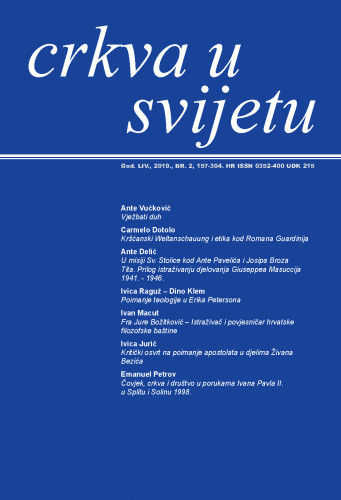O dvadesetoj obljetnici pohoda sv. Ivana Pavla II. Hrvatskoj autor analizira Papine poruke, s posebnim naglaskom na susrete u Splitu i Solinu, želeći s vremenskim odmakom od 20 godina naći uporište i neprolazne vrijednosti za Crkvu i suvremeno hrvatsko društvo. Istine o čovjeku, Crkvi i društvu na koje Papa upozorava utemeljene su na evanđeoskoj riznici i povijesnom iskustvu te imaju neprolaznu vrijednost, a nakon dva desetljeća pozivaju na pastoralnu i društvenu inventuru. U središtu pozornosti je čovjek, njegov identitet i poslanje u Crkvi i društvu. Papa se predstavlja kao hodočasnik evanđelja, jer za njega evanđelje predstavlja divljenje nad dostojanstvom čovjeka u svjetlu objave. Tako osvijetljen identitet i s njim povezano svjedočansko poslanje čovjeka, Crkve i društva usmjereni su prema izgradnji kulture života i njegova očuvanja. Čovjek je polazišna, središnja, ali i ishodišna točka evangelizacijskih i demokratizacijskih procesa. Shodno tome, imperativ današnjice je nastavak liječenja povijesnih rana, kako bi čovjek trećeg tisućljeća, nasuprot neoliberalnom kapitalizmu i konzumerizmu, mogao ostati na čvrstom temelju kršćanskih vrednota te dao svoj doprinos istinskoj demokratizacija društva.; The author analyses the address of Pope John Paul II during the second pastoral visit to Croatia, with a special emphasis on the meetings in Split and Solin, wanting to find a foundation and the invaluable value in a 20-year time gap, for the Church and Croatian society in the turbulent times of today. The truth about man, the Church and society he warns about, is based on the evangelical treasure and historical experience; it has an impassable value and after two decades invites us for a pastoral and social inventory. In the centre of the Pope's attention is man with his identity and mission in the Church and in society. The Pope is rightly presenting himself as the pilgrim of the gospel because for him the gospel represents admiration over man's dignity in the light of the proclamation. Such illuminated identity and the associated witness testimony of man, the Church, and society are directed towards building a culture of life and preserving the same. Man is the starting, the central and the underlying point of evangelization and democratization processes. The imperative of today is the healing of historical wounds, so that man could, on the brink of the third millennium, remain opposed to the dangers of hedonism and consumerism on a solid foundation of Christian values that contribute to the true democratization of society.
Sažetak

 Crkva u svijetu : 54,2(2019) / glavni i odgovorni urednik, editor-in-chief Mladen Parlov.
Crkva u svijetu : 54,2(2019) / glavni i odgovorni urednik, editor-in-chief Mladen Parlov.